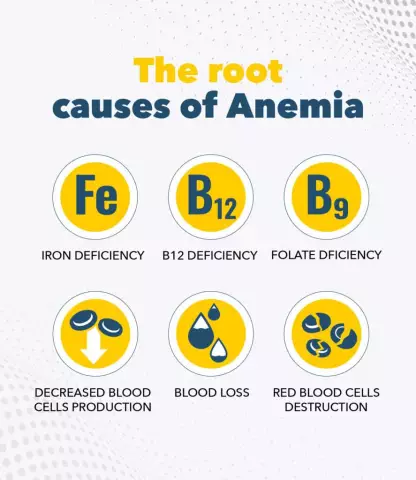- Author Rachel Wainwright [email protected].
- Public 2023-12-15 07:39.
- Last modified 2025-11-02 20:14.
Hypogalactia
The content of the article:
- Causes and risk factors
- Forms of the disease
- Symptoms
- Diagnostics
- Treatment
- Possible complications and consequences
- Forecast
- Prevention
Hypogalactia is a condition characterized by a decrease in the amount of milk secreted by the mammary glands, or a short, less than 5 months, lactation period. Is one of the main reasons for early termination of breastfeeding.

With hypogalaxy, the amount of milk in the mammary glands decreases
Causes and risk factors
Hypogalactia can be caused by many causes, including:
- neuroendocrine disorders;
- underdevelopment of the mammary glands;
- cracked nipples;
- mastitis;
- diseases of the mother (epilepsy, tuberculosis, flu);
- severe forms of gestosis;
- postpartum infections;
- traumatic obstetric interventions;
- massive bleeding in the postpartum period.
Also, the cause of hypogalactia can be the intake of certain medications (Parlodel, diuretics or hormonal agents, saline laxatives). Therefore, during the period of breastfeeding, it is unacceptable to take any medications without a doctor's prescription.
However, as practice shows, in most cases, hypogalactia develops as a result of improper organization of breastfeeding. Errors that lead to decreased milk production:
- late first attachment of the newborn to the breast;
- long breaks between feedings;
- irregular breastfeeding.
During feeding, babies swallow a small amount of air, this is a physiological phenomenon (aerophagia). But in some cases, the volume of air is so significant that it stretches the walls of the stomach and creates a false feeling of satiety in the child (pathological aerophagia). As a result, the baby abandons the breast, having received very little milk, which causes insufficient irritation of the nipple tissue and decreases lactation.
Forms of the disease
Depending on the reasons, several forms of hypogalactia are distinguished:
- Primary (true). It is caused by underdevelopment of the mammary glands or neuroendocrine disorders that affect milk secretion. It is observed extremely rarely - in no more than 5% of puerperas.
- Secondary. Its development is due to factors not directly related to the process of lactogenesis: cracked nipples, mastitis, hypovolemia, violations of the rules of breastfeeding, etc. This form of hypogalactia lends itself well to correction and can be eliminated in a few days.
- False. The mammary glands secrete a sufficient amount of milk, but the mother, for one reason or another, is convinced that the child lacks it, that he is malnourished.

Primary hypogalactia is often due to mammary hypoplasia
By the time of occurrence, there are:
- early hypogalactia - manifests itself from the first days of the postpartum period;
- late hypogalactia - manifests itself 10 days after childbirth and later.
Symptoms
With hypogalactia in the postpartum woman, there is no engorgement of the mammary glands. On palpation, they are soft, pressure on them does not lead to a good milk yield. Lack of milk becomes the reason that the child does not gain weight well, and even loses weight in severe pathology. He has a decrease in the number of urinations (less than 7-8 times per day), and the urine becomes dark, saturated color and acquires an unpleasant odor.

With hypogalactia, the baby does not gain weight and even loses weight
Diagnostics
If hypogalactia is suspected, the volume of milk produced by the mammary glands is determined. To do this, during the day, the child is weighed before and after each feeding. The difference in weight indicates the amount of milk produced. If expression was performed, then expressed milk is also taken into account when calculating. When diagnosing hypogalactia, one should not rely on the data obtained with a single control weighing, since the amount of milk a child drinks differs from feeding to feeding.
For one week of the first half of life, the child's body weight should increase by 125-150 g. If in 7 days the increase was less than 125 g, this confirms the presence of hypogalactia in the mother. It is not necessary to take into account body weight more often than once a week, since the set does not occur linearly, but in leaps and bounds.
To identify the cause of primary hypogalactia, the level of prolactin and estrogen in the mother's blood is determined, an ultrasound scan of the mammary glands is performed.
Treatment
Treatment for primary and secondary hypogalactia is different.
In the primary form of the disease, lactogonic drugs are prescribed (deaminooxytocin, lyophilisate of the anterior pituitary gland) and general strengthening therapy is performed.

For primary hypogalactia, lactogonic drugs are indicated
Therapy for secondary hypogalactia should begin with the normalization of the feeding technique, consisting of:
- avoiding long intervals between feedings;
- in the alternate attachment of the child to each breast;
- in expressing milk remaining after feeding;
- in the observance of the water regime by the nursing mother.
To enhance milk secretion, a woman should follow the daily regimen and adhere to a full-fledged high-calorie diet. A good effect in secondary hypogalactia is provided by physiotherapy (massage, electrophoresis on the mammary glands with a solution of nicotinic acid, UFO).
With false hypogalactia, psychotherapy may be necessary.

High-calorie diet enhances milk secretion
Possible complications and consequences
Without timely treatment of hypogalactia in a patient, her child's weight gain slows down, and a state of hypotrophy may develop.
Forecast
In most cases, hypogalactia responds well to treatment: within a few days, the amount of milk secreted by the mammary glands increases, and the baby ceases to lack it.
Prevention
Prevention of hypogalactia includes:
- rational management of pregnancy and childbirth;
- early attachment of the newborn to the breast;
- avoiding long intervals between feedings;
- self-massage of the mammary glands by the nursing mother;
- good nutrition for a nursing mother;
- observance of the water regime by the nursing mother.

Elena Minkina Doctor anesthesiologist-resuscitator About the author
Education: graduated from the Tashkent State Medical Institute, specializing in general medicine in 1991. Repeatedly passed refresher courses.
Work experience: anesthesiologist-resuscitator of the city maternity complex, resuscitator of the hemodialysis department.
The information is generalized and provided for informational purposes only. At the first sign of illness, see your doctor. Self-medication is hazardous to health!






